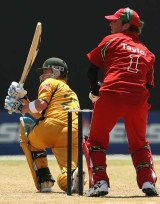When is a boycott not a boycott?
Brydon Coverdale asks why governments and cricket administrators can't seem to reach a definitive conclusion on touring Zimbabwe
Brydon Coverdale
14-May-2007
|
|

|
The Australian government's ban on Australia touring Zimbabwe has continued a worrying trend of inconsistency from governments and cricket administrators, who can't seem to reach a definitive conclusion on the country. While the decision not to tour for a three-match series in September was the right one - a popular one with senior players; one that has upset Dean Jones; and one that has reasonable public support - the matches may be held in a neutral venue after South Africa offered to step in as host.
Cricket Australia (CA) is keen to pursue that option, which raises the question of what exactly Australia objects to. Is it visiting Zimbabwe or playing Zimbabwe? If the teams compete elsewhere, the boycott would seem a hollow gesture.
Similarly, England boycotted their World Cup match in Zimbabwe in 2003 on safety grounds but toured the country a year later. In 2005, the New Zealand government let its cricketers play in Zimbabwe but stopped Zimbabwe touring New Zealand.
Perhaps sniffing a chance to gain credibility before a federal election - John Howard, the prime minister, must call the poll by the end of the year - the government backed up its hard words with action once it received a legal go-ahead. Howard would prefer Australia not to play Zimbabwe anywhere for the time being. Zimbabwe Cricket (ZC) has the president Robert Mugabe as its patron and effectively acts as an arm of his brutal government regime, which Howard this week likened to the Gestapo.
However, CA is now exploring when, where and if a rescheduled series might take place. Playing Zimbabwe in South Africa - or in Australia, England or Siberia - should be no more acceptable than in Zimbabwe itself. Would a sporting boycott of South Africa have worked as well in the 1970s and 80s if the only stipulation was that matches be held outside South Africa? It's a different scenario, but action is needed on Zimbabwe as well.
Comparing Andy Flower and Arthur Morris highlights just how appalling the standard of living has become under Mugabe. Both were classy left-handers who captained their nations in Tests. Another common trait is they are a few years past the life expectancy in their home country. Morris, a native of Sydney, is 85. If he still lived in Zimbabwe, Flower, 39, would have eclipsed the average lifespan for males by three or four years. It is a sobering statistic.
The decision over a neutral series venue will probably remain as talk, because it's unlikely Mugabe will consent to give up Zimbabwe's hosting rights. After CA was ordered not to make the trip, ZC still refused to budge, telling the Sydney Morning Herald it expected Australia to tour as planned.
|
|

|
On a less political note, even if the tour was to go ahead, what purpose would a series of three ODIs in a neutral country serve? Who would care? Australian fans could barely see the point of the three-match Chappell-Hadlee Trophy series in February, involving sides that would go to the World Cup semi-finals. That was a genuine contest between two of the best cricketing nations in the world.
Supporters are unlikely to stay up to watch what would surely be an embarrassing mismatch between the world's No. 1 team and a side ranked below Ireland at 11th. It's hard to believe the people of Zimbabwe would display much interest in the series - even if they knew it was on. They have other things on their minds, the nation's 80% unemployment rate for one; whether to stay put or attempt to flee, for another. Recent games in Zimbabwe have attracted hundreds of fans, not thousands.
Perhaps if Zimbabwe's best players were available - Heath Streak, Tatenda Taibu, Andy and Grant Flower - we could hope for a semi-competitive series. But of course they are not, as Zimbabwean cricket has become a microcosm of the nation's political situation. Like the country itself cricket in Zimbabwe is a shambles. Outsiders are having problems even finding scorecards for Zimbabwe's domestic competitions. Of course, the competitiveness or lack of it is nothing compared to the human rights violations in Zimbabwe.
Stopping a neutral series would set a clear precedent and may give other nations strength to follow a similar path. Opinion throughout the world will be divided, but consistency is needed on an issue that refuses to get a final answer.
Do you think a cricketing boycott of Zimbabwe serves the purpose? Have your say
Brydon Coverdale is an editorial assistant on Cricinfo